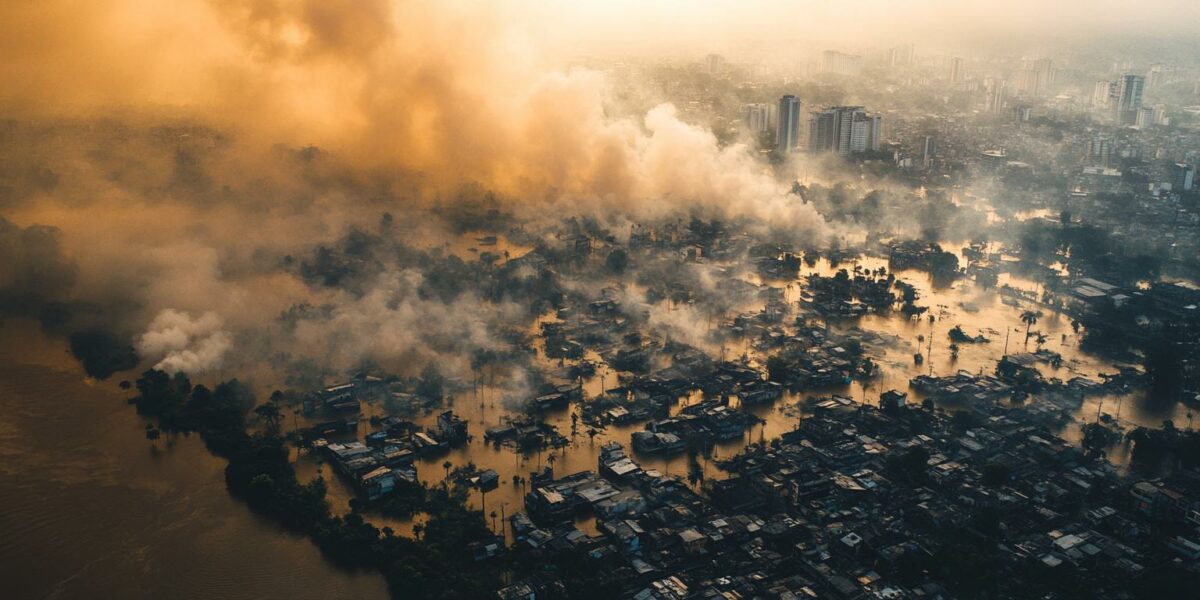Brazil’s Election Overshadowed by Climate Challenges
The recent Brazilian elections unfolded against a backdrop of severe environmental challenges. The country has faced catastrophic floods in Rio Grande do Sul, historic droughts, and relentless Amazon fires. Despite these pressing issues, the political discourse largely ignored climate change, leaving environmentalists disheartened.
While Porto Alegre’s mayoral debate touched on flood control, climate barely made it onto the broader campaign agenda. According to Claudio Angelo from the Climate Observatory, the media’s focus on social media trends rather than policy discussions contributed to this oversight.
Investigations reveal that many candidates receive financial backing from industries that benefit from deforestation, such as logging and mining. This financial entanglement silences discussions on forest conservation, especially in regions with high deforestation rates.
Brazil’s main political parties, including the ruling Workers’ Party, don’t prioritize climate change. Although President Lula advocates for green policies on international platforms, he supports domestic fossil fuel projects to maintain his coalition with centrist parties.
The Silence of Political Leaders on Environmental Issues
In Brazil’s major cities, the political narrative focused on non-local issues like Venezuela, overshadowing urgent climate concerns. This was evident in the media’s coverage, which prioritized sensational stories over vital policy debates.
Despite the general apathy, the election did witness the emergence of a “climate caucus” comprising over 300 city council candidates committed to climate-conscious policies. Out of these, 57 candidates were elected, signaling a glimmer of hope for environmental advocacy.
- The caucus plans to draft a “library of bills” for climate initiatives.
- Marina Bragante, an elected member, will serve as São Paulo’s first councilor from the Sustainability Network.
- Future meetings will focus on replicating successful policies across different municipalities.
These elected officials aim to shift the focus towards climate adaptation and mitigation, making substantial contributions to Brazil’s environmental strategy.
Upcoming Political Clashes and Environmental Stakes
The political landscape remains uncertain as Brazil prepares for mayoral runoffs in several cities. Notably, Belém is set to host the upcoming United Nations climate conference, where a center-right candidate faces a Bolsonaro ally known for downplaying climate issues.
Amidst these political dynamics, the climate caucus members are determined to advocate for stronger environmental policies. Their efforts could potentially influence future elections, emphasizing the importance of climate issues in political debates.
Internationally, Brazil faces scrutiny over its environmental policies at forums like the BRICS summit and the United Nations Biodiversity Conference. These platforms provide opportunities for Brazil to demonstrate its commitment to combating climate change.
As Brazil navigates these challenges, the role of environmental activism becomes crucial in holding leaders accountable and ensuring that climate issues are at the forefront of political discourse.
Global Implications of Brazil’s Environmental Policies
Brazil’s environmental stance has significant implications for global climate efforts. The Amazon rainforest, often called the “lungs of the planet,” plays a critical role in global carbon sequestration. Any political decisions affecting this region have far-reaching consequences.
International pressure is mounting on Brazil to enhance its environmental policies. Countries worldwide watch closely, urging Brazil to take decisive action against deforestation and promote sustainable development.
Environmentalists around the globe advocate for stronger international collaboration to address climate change. Brazil’s policies are not only a national concern but a global responsibility that requires collective action.
The future of Brazil’s environmental strategy will have profound impacts on global efforts to combat climate change, highlighting the need for urgent and coordinated initiatives.



Adam
Lula talks green but acts fossil. Is this the new politics of convenience?
Jack8
It’s frustrating to see financial interests overshadow crucial climate discussions. When will this change?
Oliver
With elections over, how can citizens ensure politicians prioritize climate issues moving forward?
Andrew5
Maybe they were too busy with social media trends to notice the Amazon burning! 😅
Rosie6
I can’t believe climate change wasn’t a bigger topic. Are politicians blind or just pretending not to see the fires?
Bentley_Moonlight
Thank you for highlighting this issue! We need more discussions like this to push for change.
Penelope
It’s disappointing to see that the elections didn’t focus on our environmental crises. Where’s the accountability?
savannah
Why are politicians ignoring climate change when it’s such a pressing issue in Brazil? 🤔